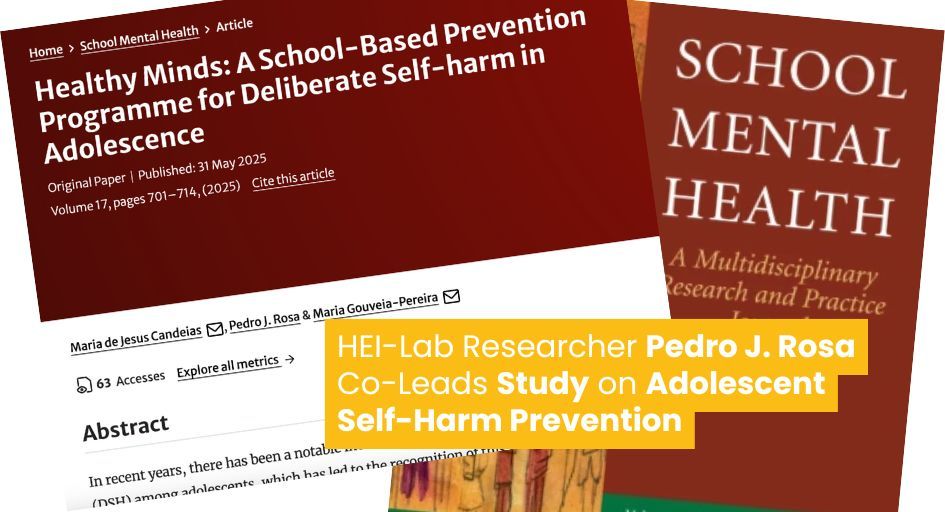News
HEI-Lab Researcher Pedro J. Rosa Co-Leads Study on Adolescent Self-Harm Prevention

Researcher Pedro J. Rosa from HEI-Lab, together with researchers from ISPA, developed, implemented, and evaluated the effectiveness of the Healthy Minds programme — a universal, school-based prevention intervention targeting deliberate self-harm in adolescents.
Pedro J. Rosa, Maria Candeias, and Maria Gouveia-Pereira published the article titled "Healthy Minds: A School-Based Prevention Programme for Deliberate Self-harm in Adolescence". https://doi.org/10.1007/s12310-025-09766-x
https://link.springer.com/article/10.1007/s12310-025-09766-x
This quasi-experimental study involved 137 participants aged between 13 and 19 years (M = 14.73; SD = 1.03), assessed at three time points: pre-intervention, post-intervention, and follow-up. The intervention showed partial effectiveness, with delayed reductions in deliberate self-harm and significant improvements in reducing false beliefs. Furthermore, both groups demonstrated increased help-seeking behaviours, and these effects were maintained during the follow-up period, suggesting long-term effectiveness.
Contact the researcher:
O investigador Pedro J. Rosa do HEI-Lab, juntamente com investigadoras do ISPA, desenvolveram, implementaram e avaliaram a eficácia do programa Mentes Saudáveis, uma intervenção de prevenção universal de base escolar dirigida à automutilação deliberada em adolescentes.
Pedro J. Rosa, Maria Candeias e Maria Gouveia-Pereira publicaram o artigo intitulado “Healthy Minds: A School-Based Prevention Programme for Deliberate Self-harm in Adolescence”. https://doi.org/10.1007/s12310-025-09766-x
https://link.springer.com/article/10.1007/s12310-025-09766-x
Este estudo, com design quase-experimental, inclui 137 participantes com idades compreendidas entre os 13 e os 19 anos (M = 14,73; DP = 1,03), avaliados em três momentos: pré-intervenção, pós-intervenção e follow-up. A intervenção demonstrou uma eficácia parcial, com reduções tardias da automutilação deliberada e melhorias significativas na redução das falsas crenças. Além disso, ambos os grupos revelaram um aumento dos comportamentos de procura de ajuda, e estes efeitos mantiveram-se durante o período de acompanhamento, o que sugere uma eficácia a longo prazo.
Contacto do investigador:
